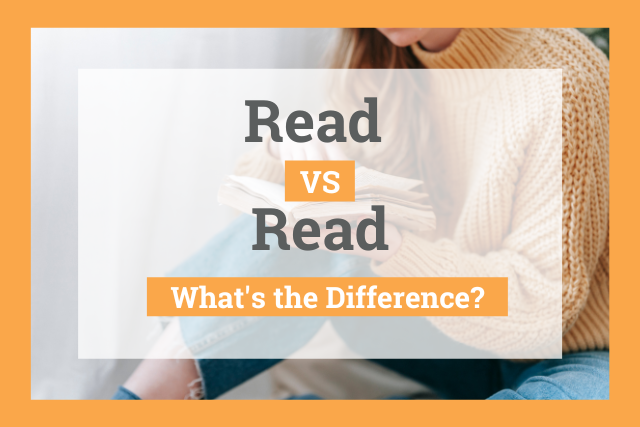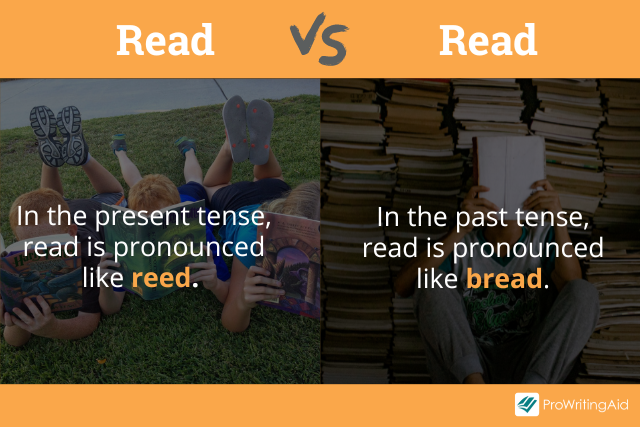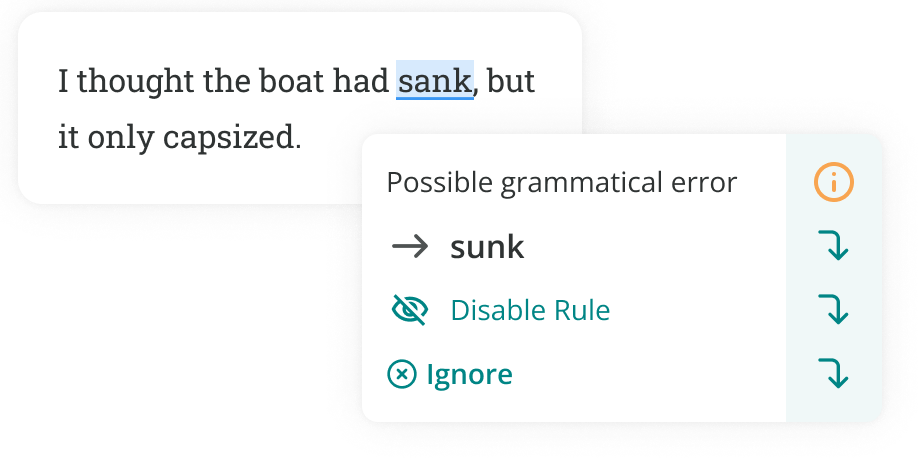
In the present tense, the word read rhymes with reed. In the past tense, it rhymes with bread.
If you find these words confusing, you’re not alone. Read (rhyming with reed) and read (rhyming with bread) are spelled the exact same way, but they’re not identical. They’re pronounced differently and have different meanings.
This article will explain the difference between read vs read, and help you understand why they’re spelled the same way.
What’s the Difference Between Read vs Read?
To read is a verb that refers to the act of looking at written words or symbols.
The present tense and past tense of the verb to read are heteronyms, which means they have the same spelling but different pronunciations.
The present tense form is read with a long E sound (pronounced like reed), and the past tense is read with a short E sound (pronounced like bread).
Read (past tense) means that someone has completed the act of reading, while read (present tense) means that someone is currently reading something.

Why Is Read Spelled the Same in the Past and Present Tense?
So why are read and read spelled the same way?
To understand this, we have to start with the two types of English verbs: regular verbs and irregular verbs.
Regular verbs are easy to conjugate. To create the simple past tense or the past participle (used after a helping verb), all you need to do is add “-ed” to the end.
For example, the past tense of jump is jumped, and the past tense of paint is painted.
Irregular verbs, on the other hand, are trickier to conjugate because they don’t follow a single rule. There are three different categories they fall into instead:
- Verbs where the present tense, past tense, and past participle are the same (e.g. cut / cut / cut)
- Verbs where two of the three forms are the same (e.g. sit / sat / sat)
- Verbs where the present tense, past tense, and past participle are all different (e.g. sing / sang / sung)
The verb to read is an irregular verb that falls into the first category, where all three forms are spelled the same (read / read / read).
For example, you would write “I read very quickly these days.” (present tense), “I read that book yesterday.” (past tense), or “I hadn’t read that one before.” (past participle). The past tense and past participle forms of read both rhyme with bread.
If you’re not sure whether or not you’re using the right form of a verb, ProWritingAid can help you check all the verbs in your writing to make sure they’re grammatically accurate.

Examples of Read (Present Tense) Used in Sentences
Let’s look at some example sentences that include the word read in the present tense (rhyming with reed).
“The man who does not read has no advantage over the man who cannot read.”—Mark Twain
“If you want your children to be intelligent, read them fairy tales. If you want them to be more intelligent, read them more fairy tales.”—Albert Einstein
“If there’s a book that you want to read, but it hasn’t been written yet, then you must write it.”—Toni Morrison
“You think your pain and your heartbreak are unprecedented in the history of the world, but then you read. It was books that taught me that the things that tormented me most were the very things that connected me with all the people who were alive, who had ever been alive.”—James Baldwin
“If you only read the books that everyone else is reading, you can only think what everyone else is thinking.”—Haruki Murakami, Norwegian Wood
“Her eyes searched his face as if she was trying to read his mind.”—Mary Lawson, A Town Called Solace
Examples of Read (Past Tense) Used in Sentences
Now, let’s look at some examples of the word read used in the past tense (rhyming with bread).
“I cannot remember the books I’ve read any more than the meals I have eaten; even so, they have made me.”—Ralph Waldo Emerson
“As he read, I fell in love the way you fall asleep: slowly, and then all at once.”—John Green, The Fault in Our Stars
“Life is a book and there are a thousand pages I have not yet read.”—Cassandra Clare, Clockwork Princess
“Where Castor had always been an open book, happy to be read and understood, Van was the journal that remained locked and tucked beneath the mattress.”—Alexandra Bracken, Lore
“She read books as one would breathe air, to fill up and live; she read books as one would breathe ether, to sink in and die.”—Annie Dillard, The Living
“Once, I read a story about a guy in the Amazon rain forest who was the last to speak his language—after he died, it would never be heard again. People tried to learn it, but it was impossible.”—Sabaa Tahir, All My Rage
Conclusion on Read vs Read
Now you know the difference between read and read. Here’s a quick recap:
- Read and read are pronounced differently, but spelled the same.
- The present tense of read has a long E sound and rhymes with reed.
- The past tense of read has a short E sound and rhymes with bread.
If you’ve read ProWritingAid’s grammar articles, you’ll be able to create clear and professional writing for others to read in the future!


